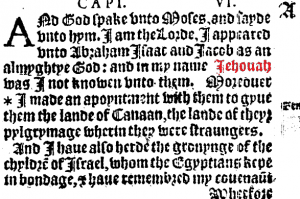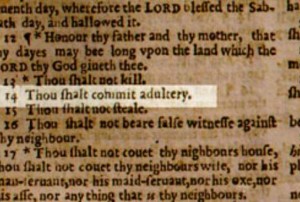 1. Paul wrote more than 2 letters to Corinth
1. Paul wrote more than 2 letters to Corinth
Some find it hard to believe that Paul would have written to a church and not 100% of his correspondences would be saved. However, there is good reason to believe that Paul may have written an additional 2 more letters to the Corinthian church. In fact, the first letter in our Bible is actually believed to be the 2nd letter. Here is the breakdown and reasoning.
Letter #1 – This letter is known as the “previous letter” as referred to in 1 Corinthians 5:9. “I wrote to you in my (previous) letter not to associate with sexually immoral people.” Of course it would make sense for Paul to remind them that he already tried to address this on-going issue with sexual immorality. Just 8 verses previously he begins to address what has been reported to him.
It is actually reported that there is fornication among you, and such fornication as is not even among the Gentiles, that one of you hath his father’s wife. (1 Corinthians 5:1 ASV)
Letter #2 – 1 Corinthians we have in our Bible.
Letter #3 – This letter is known typically as the “severe letter.” No copy of it exists but Paul mentions it in 2 Corinthians 2:4.
For out of much affliction and anguish of heart I wrote to you with many tears; not so that you would be made sorrowful, but that you might know the love which I have especially for you. (2 Corinthians 2:4 NASB)
Letter #4 – 2 Corinthians we have in the Bible.
Some will argue against the additional letters but almost all scholars at least agree on the “Previous Letter” that came before 1 Corinthians.
 2. The name Jehovah is not in the Bible
2. The name Jehovah is not in the Bible
Every time I mention this I get nearly murdered. Yes I am aware that you learned it in Sunday school and you sang songs with Jehovah in them. You probably even learned the many names of Jehovah. So what gives?
First, Jehovah is a transliteration of YHWH…… Kind of. The traditional Hebrew did not come with vowels. They were implied and people knew how to speak the words right because they grew up doing it from infancy. It wasn’t until after Jesus died that Jewish scribes called Masoretes added vowel marks to the traditional texts. The original vowels would have rendered the pronunciation of this word as “Yah-way,” or something very close to that. That is only 2 syllables.
Second, the transliteration of the Hebrew Yod (י) into English does not take the form of a “J” sound. It’s known pronunciation in Hebrew is with a “Y”. The confusion was created by early English translators leaning on the existing German translations which used a J but the German J is much softer than it’s English counterpart. It sounds like a Y in English. The confusion actually gets deeper when looking at Middle English which sometimes interchanged J and I sounds. The early medieval period saw the first widespread use of the modern J letter and it’s hard sound. Eventually English translations corrected but not without a lot of pushback from traditionalists who had little care for correctness.
Third, in about the 6th century the Jewish scribes began adjusting how the name YHWH was written. Since it was considered irreverent to actually say the name of God Jews had long practices replacing YHWH with Adonai when reading texts.We still do this today in our English Bibles. When you read “THE LORD” in the Old Testament you know that the underlying word is YHWH. In order to remind readers to say Adonai they replaced the vowels with the vowels from Adonai. That created a 3 syllable word and now combined YWHW with Adonai. The result was YaHoVaH.
 3. The Bible was misprinted and distributed multiple times
3. The Bible was misprinted and distributed multiple times
While I am going to completely skirt any conversation about textual criticism, I do want to note that a number of famous misprints happened throughout history. Some of them more notable than others.
The most notable was the “Adultery/Wicked Bible,” printed in London, 1631. This misprint accidentally left out the “not” in “thou shalt not commit adultery.” The result was a Bible where the 10 commandments were instructing people to commit adultery.
Another notable misprint is the “Denial Bible.” This Bible was printed in 1792, in Oxford. An accidental substitution of the name “Philip” was made in place of “Peter” as the disciple who denied Jesus in Luke 22:34.
 4. The Bible is the most sold AND often shoplifted book in history
4. The Bible is the most sold AND often shoplifted book in history
It might be hard to believe that someone would steal a Bible but it happens. In fact, it happens a lot. Some have claimed that the Bible is the most shoplifted book ever but there is little evidence to support that theory. However, a lot of Christian book stores have reported that the #1 thing that gets stolen from the stores are Bibles. They go right for the Bibles.
However, in sales they are definitely the king of shelf. Recognized by the Guinness book of records as selling more than 5 billion copies.
 5 . It was once illegal for people to read or translate the Bible
5 . It was once illegal for people to read or translate the Bible
Most people don’t realize that the first few people to translate the Bible into English were murdered by the Church for doing so. John Wycliff, John Huss, William Tyndale, and many other poineers were murdered by the Catholic church for trying to make the Bible readable in people’s native tongues. But why?
When the heresy of the Albigenses began to spread there was a danger from corrupt translations, and also from the fact that the heretics tried to make the faithful judge the Church by their own interpretation of the Bible (which was treason). To meet these evils, the Council of Toulouse (1229) and Tarragona (1234) forbade the people to read the common language translations of the Bible.
What seemed to be a method of protecting people against heresy would eventually be the same reason many would be put to death. Especially once the printing press started making Bibles in people’s native tongues and people began to inch towards the reformation, the Catholic church kicked the slaughtering into high gear. On one occasion they murdered close to 6,000 people involved in the French reformation.
Your comments and thoughts are welcome below.

There is a mistake in the reference to the Hebrew letters you made here. “Second, the conversion of the Hebrew Vav (ו) should never take the form of a “J” sound. It’s known pronunciation in Hebrew is with a “Y” or “V” sound.”
The letter in question not taking the J sound is a yod (י) not vav. It is the first letter and the Vav (ו) is the third of the name of God. It always takes a Y sound. The Vav (ו) in ancient hebrew is pronounced with a v sound. Others might say it is was pronounced with a w sound but today it is pronounced wit ha v sound.
You’re 100 right. I’ve written on this matter a number of times. Can’t believe my reptile brain got off track. Thanks for the correction.